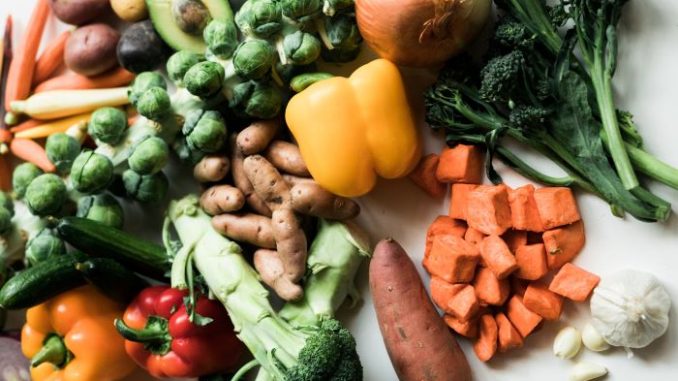
A diet high in antioxidants may reduce the risk of heart disease and certain cancers, but what about Parkinson’s? Could consuming a diet rich in antioxidant nutrients benefit people living with Parkinson’s and could eating these compounds modify disease progression? Before looking at the evidence, let’s first take a closer look at antioxidants.
What are antioxidants?
Antioxidants are compounds produced in your body and found in certain foods that may prevent or delay some types of cell damage caused by free radicals. Free radicals are unstable molecules that are naturally formed when you exercise and when your body converts food into energy. Your body can also be exposed to free radicals from a variety of environmental sources including cigarette smoke and air pollution. Free radicals can cause oxidative stress, a process that can trigger cell damage. Oxidative stress is a common feature of many neurodegenerative diseases including Parkinson’s.
Examples of antioxidants include vitamins C and E, and carotenoids, such as beta-carotene, lycopene, lutein, and zeaxanthin. Plant-based foods are rich in dietary antioxidant nutrients including vegetables and fruits, wholegrains, legumes, nuts, seeds, tea and extra virgin olive oil.
Interestingly it has been observed that people with Parkinson’s have lower levels of antioxidants in their blood.
Slowing progression of parkinsonism over time
In 2018, researchers showed several dietary antioxidant nutrients may reduce the risk of parkinsonism as well as its progression in older adults. Research participants with the highest intakes of lutein, total carotenoids and vitamin E had lower rates of parkinsonism when compared to those with the lowest intakes.
Higher intakes of beta-carotene, lutein, total carotenoids, vitamin E and vitamin C from foods were associated with slower progression of parkinsonian signs. In other words, the higher the intake of these dietary antioxidant nutrients, the slower is the progression of parkinsonism over time.
Study investigator Puja Agarwal suggested that a single daily serving of leafy green vegetables provides a good source of lutein, vegetables such as carrots, sweet potatoes, squash, and tomatoes are excellent sources of beta-carotene, a single daily serving of berries or citrus fruits is a rich source of vitamin C and a daily serving of nuts is a good source of vitamin E.
Preventing parkinsonian progression in old age
In 2020, researchers conducted a longitudinal study to assess whether the intake of antioxidant nutrients is related to the progression of parkinsonian signs in older adults. Researchers found intakes of dietary antioxidant nutrients including carotenoids, vitamin E and vitamin C were associated with slower progression of parkinsonian signs.
Further analysis found vitamin C intake from foods was associated with slower progression in men but not in women and higher beta-carotene intake from foods slowed progression in participants under the age of 80 but not in those aged over 80.
Overall study authors concluded that a healthy diet rich in antioxidant nutrients may play an important role in preventing parkinsonian signs and its progression in old age.
Dietary patterns and antioxidants
Research also suggests adhering highly to dietary patterns that are rich in antioxidant nutrients, such as the MIND diet and Mediterranean diet, is associated with slower progression of parkinsonism symptoms in older adults. Researchers propose that the antioxidant effects of foods encouraged in these dietary patterns may play an important role.
Dietary antioxidant nutrients associated with slowing or preventing progression
- Carotenoids e.g. carrots, tomatoes, watermelon, pumpkin etc.
- Vitamin E e.g. nuts, seeds, wheat germ, grains, legumes, vegetables etc.
- Vitamin C e.g. peppers, kiwi, berries, oranges, broccoli etc.
- Lutein e.g. kale, spinach, corn, carrots, squash etc.
- Zeaxanthin e.g. kale, spinach, corn etc.
- Beta carotene e.g. carrots, pumpkin, sweet potato, cantaloupe, apricots etc.
Final thoughts
A higher intake of certain dietary antioxidant nutrients may reduce the risk of parkinsonism as well as slow or prevent its progression in older adults overtime. Further research is required including randomised diet intervention trials to confirm causality. In the meantime, eating a well-balanced diet, based primarily on plant foods, is an effective way to not only get the antioxidants your body requires but a whole range of other important nutrients too.
Sources
-
National Centre for Complementary and Integrative Health, Antioxidants: In Depth, 2013.
-
Agarwal, P., Wang, Y., Buchman, A., Bennett, D., Morris, M., Association of Carotenoids, Vitamin E and Vitamin C intake with Parkinsonism and Progression of Parkinsonian signs in Older Adults, 2018; 90 (15 Supplement).
-
Cassels C., Dietary Antioxidants May Reduce Parkinsonism Risk, Progression, 2018, Medscape.
-
Agarwal P, Wang Y, Buchman AS, Holland TM, Bennett DA, Morris MC. Dietary antioxidants associated with slower progression of parkinsonian signs in older adults. Nutr Neurosci. 2022 Mar;25(3):550-557.
-
Agarwal P, Wang Y, Buchman AS, Holland TM, Bennett DA, Morris MC. MIND Diet Associated with Reduced Incidence and Delayed Progression of Parkinsonism in Old Age. J Nutr Health Aging. 2018;22(10):1211-1215.
-
Gao X, Cassidy A, Schwarzschild MA, Rimm EB, Ascherio A. Habitual intake of dietary flavonoids and risk of Parkinson disease. Neurology. 2012 Apr 10;78(15):1138-45.
-
Hughes KC, Gao X, Kim IY, Rimm EB, Wang M, Weisskopf MG, Schwarzschild MA, Ascherio A. Intake of antioxidant vitamins and risk of Parkinson’s disease. Mov Disord. 2016 Dec;31(12):1909-1914.
-
Paknahad Z, Sheklabadi E, Moravejolahkami AR, Chitsaz A, Hassanzadeh A. The effects of Mediterranean diet on severity of disease and serum Total Antioxidant Capacity (TAC) in patients with Parkinson’s disease: a single center, randomized controlled trial. Nutr Neurosci. 2022 Feb;25(2):313-320.
-
Yuan Y, Tong Q, Zhang L, Jiang S, Zhou H, Zhang R, Zhang S, Xu Q, Li D, Zhou X, Ding J, Zhang K. Plasma antioxidant status and motor features in de novo Chinese Parkinson’s disease patients. Int J Neurosci. 2016;126(7):641-6.
Parkinson Diet – Terms & conditions / Privacy policy


